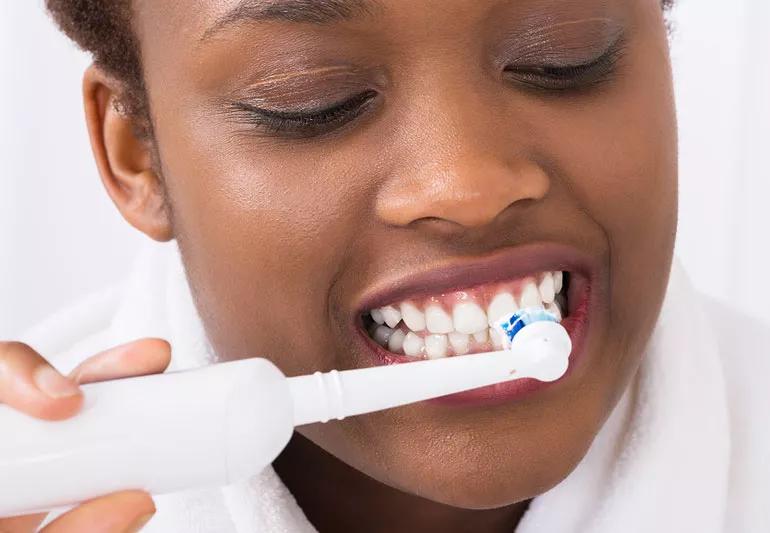It’s all about choosing the right toothbrush and hitting a 45-degree angle

Image content: This image is available to view online.
View image online (https://assets.clevelandclinic.org/transform/04f7eec3-c081-4cc3-a538-c9d386f337dc/brush-teeth-598551510-770x533-1_jpg)
Person brushing their teeth with an electric toothbrush.
Brushing your teeth is such a commonplace activity that you probably don’t think much about your technique. But as it turns out, technique matters — a lot! Brushing your teeth the right way can keep them clean enough to ward off cavities and other dental issues, while brushing them incorrectly can actually damage them.
Advertisement
Cleveland Clinic is a non-profit academic medical center. Advertising on our site helps support our mission. We do not endorse non-Cleveland Clinic products or services. Policy
Periodontist Sasha Ross, DMD, MS, explains why it’s so important to use the right brushing technique — and what, exactly, that technique entails.
Have you ever used a wet paper towel to wipe down your kitchen counter instead of spraying it down with disinfectant? Yeah, it’s kinda like that. A quick swipe over your teeth just won’t do the trick.
When you brush your teeth the right way, you get your teeth as clean as you possibly can, which does wonders for your oral health. “Taking care of your oral health can impact your overall health,” Dr. Ross says. “And beyond that, feeling confident about your smile goes so far, both socially and professionally.”
Here’s what you need to know about the correct way to brush:
Advertisement
You might not have spent much time picking out your toothbrushes in the past, but now’s the time to start. In particular, pay attention to the kind of bristles you buy. Toothbrushes and electric toothbrush heads come in soft-, medium- and hard-bristle varieties.
“Hard toothbrushes are the best at removing plaque, but they also remove part of your tooth structure,” Dr. Ross explains.
In other words, they can’t differentiate between the bad stuff (plaque) and the good stuff (your teeth and gums themselves). Hard bristles can erode your tooth enamel, which may lead to cavities, and wear away at your gum tissue, which can cause gum recession.
“They’re too abrasive,” she adds, “so it’s best to stay away from them and stick with soft or sensitive bristles instead.”
The toothpaste aisle is full of options: Ones that claim to support gum health, decrease sensitivity, whiten your teeth or prevent cavities. But Dr. Ross says that for the most part, their ingredients are the same.
“To treat and prevent cavities, the most important thing is that you use a toothpaste that’s fluoridated,” she says. “You should also stay away from toothpastes with a lot of baking soda, which are very abrasive.”
“Electric toothbrushes are what I recommend, as studies show that they do a better job than manual ones,” Dr. Ross advises.
A 2021 study found that electric toothbrushes removed more plaque from molars than manual toothbrushes did, though it showed no difference in removing plaque from incisors. And a study from 2022 found that after 12 weeks of using an electric toothbrush, 86% of participants showed reduced plaque and gum bleeding.
There are two main brands of electric toothbrushes on the market today:
“Each company says their technology cleans better than the other one, but the truth is that we don’t have any recent studies to confirm one way or another,” Dr. Ross says.
You should brush your teeth two times a day for two minutes at least one of the times. It’s easy to keep track of that timeframe if you’re using an electric toothbrush, as most of them have a timer that tells you when your two minutes are up.
Advertisement
But you may need to brush more than twice a day, depending on your eating habits. “If you’re eating multiple small meals throughout the day, you need to be brushing your teeth more often to prevent cavities,” Dr. Ross warns. And don’t forget to floss!
Advertisement

Delivered every Tuesday!
Sign up for our Health Essentials emails for expert guidance on nutrition, fitness, sleep, skin care and more
It's a letter about the news!

Every two weeks once
Sign up for our Health Essentials emails for expert guidance on nutrition, fitness, sleep, skin care and more.
Learn more about our editorial process.
Advertisement
The numbness and tingling should wear off in about two hours
Tricks to finding a toothpaste that really works
Silver fillings are perfectly safe
Help and encourage them to brush and floss regularly, limit sugary foods and get routine dental checkups
Benefits typically include bi-annual screenings and lower payments on procedures like fillings and crowns
Dental care is not only safe during pregnancy, but it’s also highly recommended
This tool is an add-on to your regular brushing and flossing habits, not a replacement for them
It’s simpler than you might think
Type 2 diabetes isn’t inevitable with these dietary changes
Applying a hot or cold compress can help with pain
Pump up your iron intake with foods like tuna, tofu and turkey